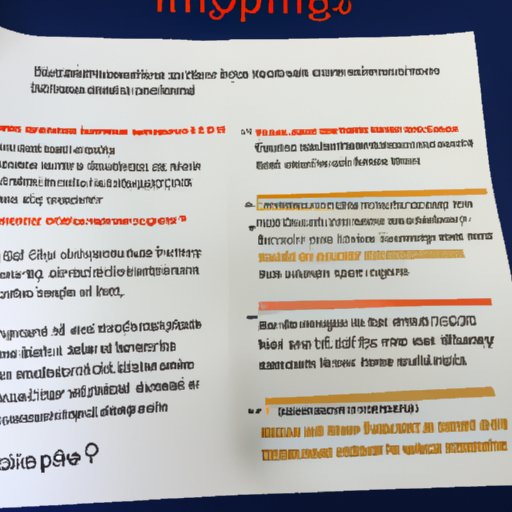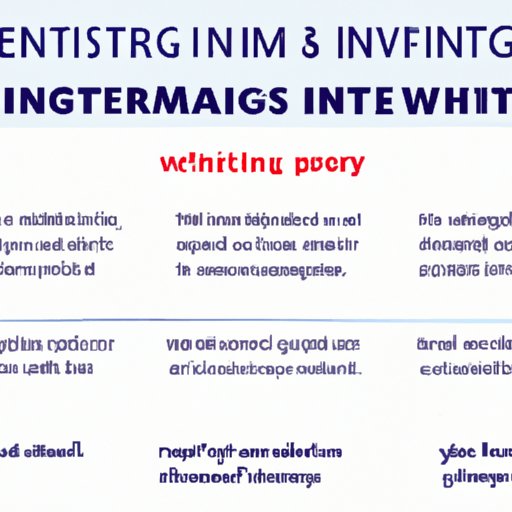Introduction
Informative writing is a type of writing that is used to explain, inform, or describe. It is important to note that this type of writing does not include the writer’s opinions or arguments; instead, it focuses on providing factual information in a clear, concise, and organized manner. The goal of informative writing is to educate the reader about a particular topic. In order to do so, it must be written in an objective and unbiased manner.

Understanding the Essential Elements of Informative Writing
When it comes to informative writing, there are certain elements that are essential for success. These elements include clarity, accuracy, coherence, focus, and argumentation. Each element plays an important role in creating an effective piece of informative writing.
Clarity
Clarity is the most important element of any type of writing, but especially informative writing. If the writing is not clear, then the reader will not understand what is being said. Clarity also helps ensure that the information is being conveyed accurately. When writing informatively, it is important to use simple language and avoid jargon or technical terms that may confuse the reader.
Accuracy
Accuracy is another important element of informative writing. This means that all facts and figures should be correct and up-to-date. Any sources used should also be reliable and reputable. It is important to double check all information before including it in the writing.
Coherence
Coherence is the ability of the writing to flow logically from one point to the next. This ensures that the reader can follow the train of thought and understand the main points being made. Coherence can be achieved by using transitions between paragraphs and sections as well as signal words and phrases.
Focus
Focus is another key element of informative writing. This means staying on topic and avoiding digressions or tangents. It is important to maintain a consistent focus throughout the entire piece of writing.
Argumentation
Argumentation is the use of evidence, facts, and logic to support a claim or point. Argumentation is important in informative writing because it helps to convince the reader of the validity of the claims being made. Sources should be used to back up any claims and the evidence should be presented in a logical manner.

Exploring Examples of Informative Writing
Informative writing can take many forms. Some of the most common examples include scientific research papers, editorials, and biographies. Each type of writing has its own set of characteristics that make it unique.
Scientific Research Papers
Scientific research papers are written by scientists and are used to communicate their findings. They provide detailed information about a specific topic and usually include data and charts to illustrate their points. Scientific research papers are typically written in a formal tone and require extensive research and analysis.
Editorials
Editorials are opinion pieces that are written by journalists and published in newspapers or magazines. They often discuss current events or issues and provide an analysis of the situation. Editorials are typically written in a more casual tone than scientific research papers and typically focus on providing the reader with an informed opinion.
Biographies
Biographies are written about people and provide an in-depth look at their lives. They typically include details such as the person’s background, accomplishments, and struggles. Biographies are usually written in a narrative style and provide insight into the subject’s life.
Analyzing How to Craft an Effective Informative Essay
In order to write an effective informative essay, there are several steps that need to be taken. These steps include choosing a topic, brainstorming, researching, outlining, writing, revising, and editing. Following these steps will help ensure that the essay is well-organized and contains accurate and up-to-date information.
Choosing a Topic
The first step in writing an informative essay is to choose a topic. It is important to choose a topic that is interesting and relevant to the reader. The topic should also be something that the writer is knowledgeable about or can easily research.
Brainstorming
Once a topic has been chosen, the next step is to brainstorm ideas. This can be done by writing down any thoughts or ideas that come to mind. This will help to generate ideas and create a plan for the essay.
Researching
The next step is to research the topic. This involves gathering information from reliable sources such as books, articles, websites, and interviews. It is important to ensure that all sources are credible and up-to-date.
Outlining
After researching the topic, the next step is to outline the essay. This involves creating a structure for the essay and deciding which points will be discussed in each section. An outline will help the writer stay focused and organized when writing the essay.
Writing
Once the outline is complete, the next step is to begin writing the essay. It is important to stay focused and organized while writing. This includes making sure that all points are supported with evidence and that the essay flows logically from one point to the next.
Revising
After the essay is written, it is important to revise and edit it. This involves reading through the essay and making any necessary changes. This could include rewriting sentences, adding or removing information, or restructuring the essay.
Editing
The final step is to edit the essay. This involves checking for grammar, spelling, and punctuation errors. It is important to make sure that the essay is free of any errors before submitting it.

Examining Common Mistakes to Avoid When Writing Informatively
When writing informatively, it is important to avoid common mistakes. These mistakes include not staying focused, not knowing your audience, poor organization, and weak evidence. Avoiding these mistakes will help to ensure that the essay is effective and informative.
Not Staying Focused
One of the most common mistakes when writing informatively is not staying focused. It is important to stick to the topic and avoid digressions or tangents. Staying focused will help to ensure that the essay is clear and concise.
Not Knowing Your Audience
Another mistake to avoid is not knowing your audience. It is important to consider who the essay is being written for and tailor the language and content accordingly. Knowing the audience will help to ensure that the essay is effective.
Poor Organization
It is also important to ensure that the essay is well-organized. Poor organization can make the essay difficult to follow and can lead to confusion. Using an outline and transitions between paragraphs can help to ensure that the essay is organized.
Weak Evidence
Lastly, it is important to use strong evidence to support any claims. Weak evidence can weaken the argument and make it less convincing. It is important to use reliable sources and present the evidence in a logical manner.
Developing Strategies to Make the Writing Process Easier
Writing an informative essay can be a daunting task. To make the process easier, there are several strategies that can be used. These strategies include breaking down tasks, taking breaks, working with others, and setting deadlines.
Breaking Down Tasks
One strategy is to break down the task into smaller, more manageable steps. This can help to make the task seem less overwhelming and can help to keep the writer focused and on track.
Taking Breaks
It is also important to take breaks throughout the writing process. Taking a break can help to relieve stress and can provide a much-needed mental break. It is important to give the mind time to rest and recharge.
Working with Others
Working with others can also help to make the writing process easier. Working with someone else can provide motivation and can help to keep the writer on track. It can also be helpful to have someone else review the essay and provide feedback.
Setting Deadlines
Lastly, it is important to set deadlines. Setting deadlines can help to ensure that the essay is completed on time and can help to keep the writer motivated. It is important to give yourself enough time to complete the essay without rushing.
Investigating Ways to Improve Your Informative Writing Skills
Improving one’s writing skills takes practice and dedication. There are several strategies that can be used to improve one’s informative writing skills. These strategies include reading more, practicing, seeking feedback, and taking classes.
Reading More
One way to improve one’s writing skills is to read more. Reading can help to expand one’s vocabulary and can provide insight into different styles of writing. It can also help to inspire new ideas and can provide a source of inspiration.
Practicing
Practice makes perfect. Writing regularly will help to improve one’s writing skills. Writing can be done in a variety of formats such as essays, blog posts, or even short stories. Practicing will help to hone one’s writing skills.
Seeking Feedback
It is also important to seek feedback from others. Having someone else read one’s work and provide feedback can be beneficial. It can help to identify any areas that need improvement and can provide valuable insight.
Taking Classes
Finally, taking classes can be helpful. Taking a writing class can provide useful tips and techniques for improving one’s writing skills. It can also provide a forum for discussing ideas and receiving feedback from other students.
Conclusion
In conclusion, informative writing is a type of writing that is used to explain, inform, or describe. It is important to understand the essential elements of informative writing, such as clarity, accuracy, coherence, focus, and argumentation. Examples of informative writing include scientific research papers, editorials, and biographies. In order to craft an effective informative essay, it is important to follow certain steps such as choosing a topic, brainstorming, researching, outlining, writing, revising, and editing. Additionally, it is important to avoid common mistakes such as not staying focused, not knowing the audience, poor organization, and weak evidence. To make the writing process easier, it is important to break down tasks, take breaks, work with others, and set deadlines. Lastly, it is important to read more, practice, seek feedback, and take classes in order to improve one’s informative writing skills.
(Note: Is this article not meeting your expectations? Do you have knowledge or insights to share? Unlock new opportunities and expand your reach by joining our authors team. Click Registration to join us and share your expertise with our readers.)
